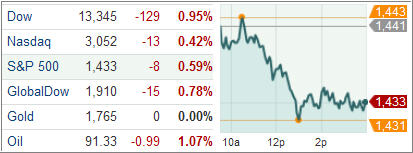US stocks pulled back sharply Wednesday with the S&P 500 posting its fourth down session in a row, as investors became concerned over growth, or the lack thereof, after aluminum producer Alcoa cut its global demand outlook citing weak Chinese demand.
Chevron’s warning on third quarter profits weighed on the Dow Industrials after the oil conglomerate said Q3 earnings will be substantially lower than second quarter results.
Extending losses into the third straight session, the Dow Jones Industrial Average (DJIA) plunged 129 points as breadth within the blue-chip index turned negative with laggards overshadowing winners 26 to 4.
The S&P 500 Index (SPX) shed 9 points with energy hitting the ground hardest and financials fronting the gainers among its 10 business groups.
Treasuries extended their winning streak after European leaders failed to make any breakthrough over containing the region’s sovereign debt crisis, increasing the allure of safe haven assets.
Risk appetite diminished further after the latest report by the Mortgage Banker’s Association showed last week’s mortgage applications fell 1.2 percent over the previous week. The Federal Reserve’s latest Beige Book survey failed to boost sentiment after the latest report revealed economic activity in September and early October continued to expand at a modest pace across 12 districts.
The benchmark 10-year Treasury yield dropped three basis points to 1.68 percent while yield on the 30-year Treasury bond fell four basis points to 2.88 percent.
Meanwhile, the ICE dollar index, a gauge of the greenback’s strength against a basket of six global currencies, rose to 80.065 from 79.973 breaching the 80-mark for the first time in a month.
European stock markets got hammered with the pan-European Stoxx Europe 600 index falling 0.6 percent after the International Monetary Fund warned about the ongoing debt crisis.
Banks were the worst hit after the multilateral lender said European banks may have to shed $4.5 trillion in assets if the region’s leaders failed to contain the contagion.
The IBEX 35 index tumbled one percent in Madrid while the FTSE MIB index pulled back 0.4 percent in Italy. Shares of Spain’s Banco Popular Espanol crashed 4.47 percent.
UK banks, however, defied the trend with Lloyds Banking Group and Royal Bank of Scotland gaining 3.99 percent and2.1 percent respectively after Liberum Capital said the banks would benefit the most from rapid deleveraging. However, oil firms weighed on the London benchmark, pushing the FTSE 100 index lower by 0.6 percent.
On a more positive note, the region’s finance minister announced after a two-day meeting in Luxemburg Portugal will be given time till 2014 to meet its budget deficit targets, paving the way for Lisbon to receive the next tranche of bailout money.
In Germany, the DAX 30 index edged 0.4 percent lower after index component SAP AG tanked two percent following Barclay’s downgrading the software company to equal-weight from overweight.
The CAC 40 index in Paris shed 0.5 percent after UBS cut Compagnie de Saint-Gobain SA to neutral from buy.
In the ETF space, energy-linked funds lagged as oil heavyweight Chevron sank 4.2 percent after issuing warnings on third quarter profits late Tuesday. The stock was also hit after the US Supreme Court refused to halt a $19 billion Ecuadorean court judgment against the firm for polluting the Amazon.
The State Street Energy Select Sector SPDR (XLE) was one of the biggest percentage decliners, shedding 1.87 percent on the day after a dismal performance by its second largest holding Chevron.
There were no real positives to be found anywhere, and our Trend Tracking Indexes (TTIs) succumbed as well but so far managed to stay above their respective long-term trend lines by +2.36% (Domestic TTI) and +2.15% (International TTI).
As has been the case in the past, the more volatile International TTI will likely slip into bear market territory first should this current downtrend continue. As we get closer, I will update these numbers on a daily basis.
Disclosure: No holdings
Contact Ulli
